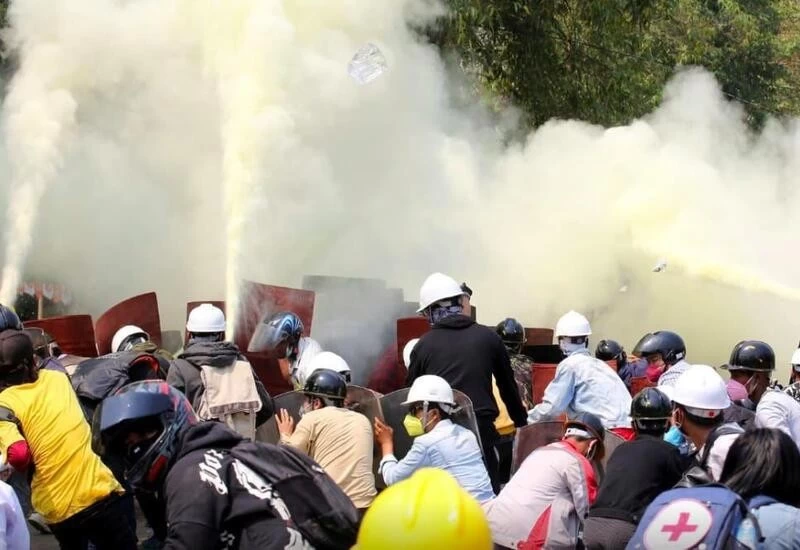Mandalay: Security forces shot dead two people in northern Myanmar on Monday, local media reported, as the military government continued its attempt to stamp out opposition to its February 1 coup.
The Irrawaddy newspaper said the victims were shot in the head during anti-coup protests in Myitkyina in Kachin State. Graphic video on social media showed protesters in the street backing away from tear gas, responding with rocks, then fleeing after a fusillade of what seemed to be automatic gunfire.
Demonstrators hurriedly carried away a number of injured people, including one apparent fatality, a person who had sustained a severe head wound. A second body was seen later on a stretcher, his head covered with a cloth.
To date, the government''s violent crackdown has left more than 50 protesters dead. At least 18 people were fatally shot on Sunday last week and 38 on Wednesday, according to the U.N. Human Rights Office.
Security forces also clamped down on anti-coup protesters elsewhere Monday, firing tear gas to break up a crowd of about 1,000 people who were demonstrating in the capital, Naypyitaw. The protesters deployed fire extinguishers to create a smoke screen as they fled from authorities.
Thousands of protesters who marched in Mandalay, the country''s second-largest city, dispersed on their own amid fears that soldiers and police were planning to use force to break up their demonstration.
Meanwhile, an armed force from one of Myanmar''s ethnic groups deployed to protect anti-coup marchers in the wake of a brutal junta crackdown.
The unit from the Karen National Police Force (KNPF) arrived shortly after dawn to accompany about 2,000 protestors near Myitta in Tanintharyi Region in south-eastern Myanmar. They carried an assortment of firearms including assault rifles as they marched ahead of the column down dusty rural roads.
The KNPF are under the control of the Karen National Union (KNU), one of many ethnic organisations that have been fighting for greater autonomy from the central government for decades. The KNU employs both political and, through its armed wing, military means to achieve its aims.
Large-scale protests have occurred daily across many cities and towns in Myanmar since the country''s military seized power, and security forces have responded with ever greater use of lethal force and mass arrests.
Details of protests and actions by security forces have been reported extensively by news media and by individuals on Facebook and elsewhere. On Monday evening, the military government announced that the licenses of five local media outlets — Mizzima, DVB, Khit Thit Media, Myanmar Now and 7Day News — have been cancelled.
"These media companies are no longer allowed to broadcast or write or give information by using any kind of media platform or using any media technology,” it said on state broadcaster MRTV.
The coup and its violent aftermath have led foreign governments and international organisations to impose measures against Myanmar''s military leaders.
In the latest case, Australia suspended its defense cooperation with Myanmar and is redirecting humanitarian aid in the country because of the military takeover and detention of an Australian citizen.
Australian Foreign Minister Marise Payne said Monday that diplomats and relatives had only been able to contact economic policy adviser Sean Turnell twice by phone since he was detained in early February. She described the access as “very limited consular support.”
Australia announced late Sunday that it had suspended a defense training program with Myanmar worth about 1.5 million Australian dollars ($1.2 million) over five years. The programme had been restricted to noncombat areas such as English-language training.
Australian humanitarian aid will be directed away from the Myanmar government and government-related entities. Instead it will focus on the immediate humanitarian needs of the most vulnerable and poor in Myanmar, including the Rohingya and other ethnic minorities, Payne said.
On Sunday, police occupied hospitals and universities and reportedly arrested hundreds of people involved in protesting the military takeover.


